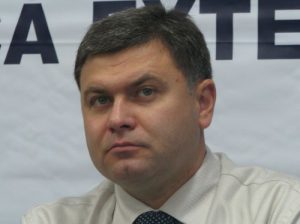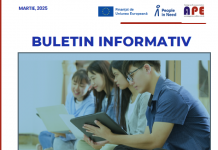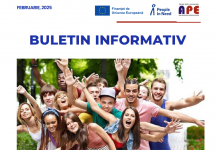On June 10, the Russian ambassador Valeri Kuzmin tried once again the limits of the Chisinau authoritys pragmatic patience. Taking advantage of the reception organized with the occasion of Russias national day, he gave the word to the Transnistrian region representative Vladimir Yastrebchak, presenting him no more, no less, as foreign minister of Transnistria”. To his surprise, but also to ours, the proverbial patience of the Moldovan diplomats has broken”, as they left the reception as a sign of protest. No less surprising was the gesture of American and European diplomats present at the event, that followed the act of dignity and courage of our diplomats.
Ambassador Kuzmins gesture was described differently by the three parties of the Alliance for European Integration. Marian Lupu, Interim President of the Republic of Moldova and Chairman of the Democratic Party, believes that what happened is an unfortunate incident” a isolated action” neither coordinated nor planned with the Russian Foreign Ministry. Vlad Filat, Moldovan Prime Minister and leader of the Liberal Democratic Party, considers that the gesture of ambassador Kuzmin is an offense against the Moldovan citizens”, but he hopes that it is just a diplomatic blunder”. Mihai Ghimpu, leader of the Liberal Party, thinks that an ambassador who does not respect our state, independence, sovereignty, has nothing to do in our country”.
Representatives of the Communist Party, the most passionate advocates of the statehood and integrity of the Republic of Moldova, avoided commenting explicitly on the incident, preferring to cover up the event by formulating some psychological and gastronomical incongruous assumptions. Moreover, some of them think that the gesture in question occurred on the territory of the Embassy, so on territory of the Russian Federation, and therefore Ambassador Kuzmin had every liberty to do it. This ridiculous logic shows a terrible lack of basic knowledge in international law. Or, they should know that Russia, as a sovereign state, is a subject of international law, which requires all states to comply with an binding set of universal principles, which include the sovereign equality of states, the noninterference in internal affairs, the respect of states independence and territorial integrity. Given their universal and mandatory character, disregard or violation of these principles is equally reprehensible, regardless of location, territory or jurisdiction where such cases would occur.
Concerned with the need to appease the immediate negative consequences of the unfriendly gesture committed by Ambassador Kuzmin, most of our politicians prefer either to minimize the case by reducing it to the status of an unfortunate diplomatic gaffes, or to neglect it completely. Both options are wrong. Ambassador Valeri Kuzmin is one of the most active and professional diplomats that Moscow has had so far in Chisinau. Diplomats of his level do not make accidental blunders, their gaffes are either deliberate or calculated actions of a well-thought and planned policy. In this case, Ambassador Kuzmins action is not singular, it is part of a whole range of diplomatic actions and protocol practices which reveals the promotion by the Russian Federation of a systematic policy that aims to officially consecrate the concept of legal equality” between Tiraspol and Chisinau. Who still have doubts on that, we invite them to review the Moscow memorandum from 1997, the 2003 Kozak Memorandum, Medvedev-Voronin-Smirnov Declaration of 18 March 2009, to explore the official websites of the Foreign Ministry, State Duma and Russian Presidency, read press releases issued by these institutions where legal terms as President of Transnistrian Moldovan Republic, the Supreme Soviet of the Transnistrian Moldovan Republic, Foreign Minister of the Transnistrian Moldovan Republic, etc., are used bluntly. It is well known that in international law there is no such state, it seems, however, that for the Russian Federation, it does not matter.
Moscow understands that after the failure of the Kozak Memorandum, no reasonable politician in Chisinau, be it communist, will ever recognize legal equality” of Tiraspol in relation to Chisinau. Why? Because legal equality” required by Tiraspol and Moscow as a precondition for restarting the official negotiations, would mean to accept, from the outset, the existing situation of the Transnistrian region; to admit that a future state would be composed of at least two equal subjects; that Tiraspol and possibly Comrat, as equal subjects with Chisinau, will be able to appeal to the principles of international law, particularly the right to self-determination”, understood by them as secession”, whenever they would want to and in spite of any guarantor; that Tiraspol and Comrat as equal subjects with Chisinau will be able to use international law to decide for themselves on the issue of keeping foreign troops on their territory; that Chisinaus European integration agenda will be definitely undermined by integration agenda with the Russian Federation and CIS of Tiraspol and Comrat etc.. To ignore these potential risks, means not to understand that by recognizing the legal equality” of Tiraspol in relation to Chisinau, especially considering their deep division on geopolitical grounds, you sign, in fact, the clinical death of the Republic of Moldova.
The refusal of Moldovan authorities to recognize status-quo of the Transnistrian region, represents for the Russian diplomacy an important obstacle to consecrate officially the concept of legal equality” between Tiraspol and Chisinau. Russian diplomacy has, however, enough experience and skills to get around this obstacle, for instance, by transforming the concept of legal equality” in CUSTOM, which is nothing but an unwritten norm of law consecrated officially by a long practice. Actually, paraphrasing Mikhail Gorbachev, this process has begun (protsess poshel) already 20 years ago. In international relations, custom, along with treaties, is considered the source of international law. For the actions, practices and diplomatic rules to become customary norms, it is necessary to undertake, apply or use them uniformly and for a long period of time. Moreover, they have to be considered by States as expressing a legally binding rule of behavior. Consequently, according to theory, in order to have a biding custom norm, we have to have: an objective element (factual) – a general behavior of the states, relatively long and uniform, as well as a subjective element (psychological) – confidence of the states that the rule they respect has acquired a legal obligation.
There is no secret that the Russian Federation has recognized, long time ago, tacitly legal equality” of Tiraspol in relation to Chisinau and this fact is plainly revealed by actions and diplomatic practices undertaken and implemented systematically by the Russian authorities with regard to Transnistrian administration. Yet, in order to transform those systematic actions and practices in a full-fledged biding customary norm, it must be recognized by many countries as possible, or at least by the actors of the 5+2” format: OSCE, Ukraine, EU and USA. However, as long as Moldova’s Law on Basic Provisions of the legal status of settlements from the left bank of the Nistru River (Transnistria) from 22 July 2005 will exist, neither OSCE, U.S., EU, nor Ukraine will follow the practice of tacit recognition of the legal equality” of Tiraspol in relation to Chisinau. In other words, they will refrain from turning the concept of legal equality” in a biding customary norm. Let us hope that our politicians understand this too.
Victor Chirila, Executive Director, Foreign Policy Association, for Info-Prim Neo, Roma, 16.06.2011







